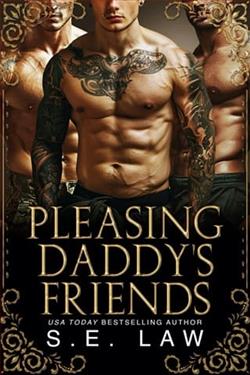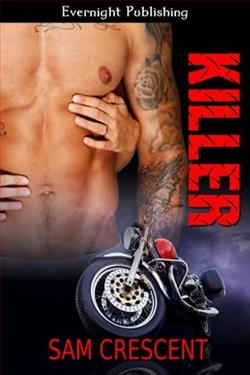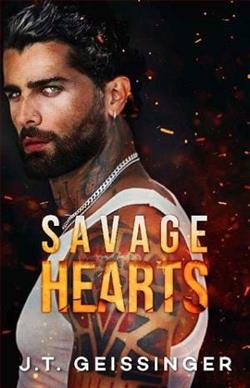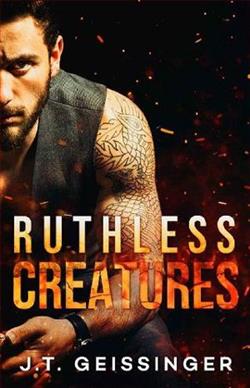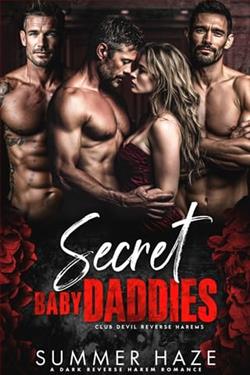Page 33 of Edge of Darkness (Night Prowler 4)
Ember expected a house—this definitely wasn’t the industrial side of town—but what she saw instead in the distance was a mansion, massive and sprawling, nestled in the hollow of a low hill surrounded by dense forest. It was dark and brooding, this place, with an elaborate French roof, iron finials on arches, and lightless windows over three stories that reflected back the moonlight like row after row of sightless eyes. It looked more like a fortress than a country home. Ember felt the fortress metaphor even more apt when she spied the low stone bridge that they would have to cross in order to arrive at the circular drive in front of the house.
There was a bridge because there was a moat.
It was beautiful in a forbidding sort of way, and for some reason Ember felt an odd sort of recognition, almost déjà vu, as if she’d been here before, or somehow knew this place.
“It looks very…secure.”
Corbin’s only response was a noncommittal noise of agreement.
Once over the bridge and parked in the lamp lined circular drive, Corbin helped her from the car and accompanied her silently over the groomed gravel to the massive front doors that swung open on silent hinges. He ushered her through and bid her to wait in a room just off the main hall, a room with a fire crackling merrily in the hearth, a huge mahogany desk with two high-backed crimson leather chairs in front of it, and three walls lined to the ceiling with books.
After a deep bow in her direction, Corbin retreated, and Ember was left alone in the library.
And what a library it was. There were more first edition classics than Antiquarian Books had ever owned, books the value of which she could not even guess. Henry James and Virginia Woolf and Samuel Johnson, a section of works in beveled glass cases that included a sheaf of stained vellum from the Elizabethan era. It was an original hand written manuscript by Christopher Marlowe that was, by itself, worth a fortune.
Because there were no surviving original works by Christopher Marlowe.
Ember drew close to the case, mesmerized, staring in open-mouthed awe at the papers. Staring at the inkblots and ragged edges, at the irregular brown stain in one corner she imagined was a centuries-old drop of spilled wine.
“Magnificent, isn’t it?” came the low voice from right behind her. With a startled yelp, Ember jumped and turned to find Christian standing not two feet away, gazing down at her with hooded eyes and a faint smile on his lips.
Her first instinct was simply to stare at him, because in his own home, surrounded by all this finery, he was somehow even better-looking than ever before. He was dressed in a suit, as he’d been the first time she’d seen him, this one a deep, midnight blue with a pewter pocket square and a matching pewter dress shirt, open at the throat. No tie. Skin, face, hair: perfect. Square jaw, full lips, straight nose: check.
Beautiful. Why did he have to be so beautiful?
The faint smile grew wider as she took him in, and her mouth went dry.
“I think you’re rude,” she pronounced, to manage the heat he conjured in her blood.
“So I’ve been told,” he replied, holding her gaze. “I believe the word ‘dick’ was mentioned?”
Oh, you traitor, Corbin!
“Hey, if the shoe fits…” Ember shrugged and crossed her arms over her chest, a small sort of safety measure, because suddenly it seemed he was standing much too close.
He ignored that. His gaze leisurely travelled over her hair, her dress, the dainty sandals, and her painted toes. When he looked back into her eyes there was an edge to his own, a dark burn that made her want to take a step back. She didn’t.
“You look edible,” he murmured, staring straight into her eyes.
If she hadn’t already been so angry with him, that would have really pissed her off.
“I came here to tell you to your face that I think you’re an egotistical, entitled, spoiled, bad-mannered, inconsiderate—”
“Don’t forget dick,” he cut in, his eyes bright with laughter.
“—oaf!” she finished, fighting the urge to stamp her foot.
His brows rose. “Oaf? Hmm, this is dire. I don’t mind being called all those other names, but an oaf, now, that really hurts.”
“You’re laughing at me,” she said, astonished. “Again! After you stood me up—”
His face darkened. “I would never stand you up, September. I merely had a pressing issue to attend to and could not get away on time—”
“Yes, so I was told! And are you going to tell me what exactly this pressing issue was? Because in my opinion, unless it was life or dea
th, you stood me up.”
His face took on an odd expression, a mix of sadness, resolve, and even a hint of rage, all quickly smothered. He quietly said, “And if I told you that it was life or death, would you believe me?”








